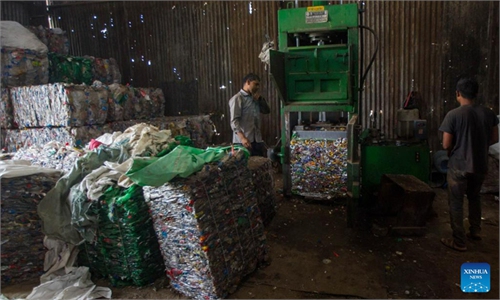China releases renewed citizens’ 10 dos and don’ts for environment protection, underlining knowledge on biodiversity, climate change

The National Event of World Environment Day hosted in Jinan, East China's Shandong Province on June 5, 2023 Photo: Shan Jie/GT
China released its newly revised code that is to guide citizens' environment-friendly lifestyles and actions on World Environment Day on Monday, with added content on biodiversity preservation and climate change tackling.
The National Event on World Environment Day was held on Monday in Jinan, the capital city of East China's Shandong Province. At the event, the Ministry of Ecology and Environment, together with four other national departments or organizations, jointly issued the newly revised Code of Conduct for Environmental Protection.
The newly revised code includes care for the ecological environment, conservation of energy and resources, practicing green consumption, choosing forms of low-carbon transportation, waste sorting, pollution reduction , protection of the natural ecology, participation in environmental practices, engagement in environmental supervision, and the building of a beautiful China.
These new code aims to provide clearer guidance for the public to encourage engage in ecological environmental protection behaviors, the Global Times learned from the Ministry of Ecology and Environment.
For instance, the code expounds on how the public should acquire knowledge covering key areas such as environmental pollution control, biodiversity conservation, and climate change mitigation. It also highlights the importance of learning and acquiring relevant environmental protection skills.
During the revision process, the revised code also took into account ecological environment issues that the public is concerned about and provided specific and detailed guidance. For example, it proposes "avoiding noise disturbance to neighbors," "rejecting excessive waste," and promotes "rational and responsible consumption."
Additionally, considering the varying difficulty of implementation in different regions, the code suggests that air conditioner temperature should be set not lower than 26 C in summer and not higher than 20 C in winter.
Released on June 5, 2018, the Code of Conduct for Environmental Protection is the first comprehensive nationwide ecological environment behavior code specifically targeting citizens, the Global Times learned.
The Monday event also awarded outstanding cases and figures of public participation in environmental conservation in fields such as voluntary work, confronting climate change, and the preservation of biodiversity.
World Environment Day has been held since 1972. This year, the theme of China's national event was "Building the modernization of harmony between humanity and nature."
At the Monday event, Southwest China's Guangxi Zhuang Autonomous Region was announced to be the host of the National Event on World Environment Day in 2024.
China has seen great achievements in environmental improvement thanks to efforts from various parts of society and government departments.
For instance, in recent years, Shandong has made great efforts to promote the construction of a natural protected area system centered around national reserves to protect biodiversity. Currently, the province has a total of 528 natural protected areas at various levels, ensuring effective protection for over 85 percent of the key nationally protected wildlife species, the Dazhong Daily reported.
In 2022, biodiversity has shown significant recovery and improvement. According to a report by local media sources, 471 bird species inhabiting Shandong, accounting for over 30 percent of the total of bird species in China.
On the day, the Supreme People's Procuratorate of China released a white paper on the prosecution of ecological environment and resource protection crimes. According to the white paper, from 2018 to 2022, prosecutorial organs throughout the country accepted a total of 65,432 cases involving environmental and resource protection crimes, involving 109,848 individuals. Among these cases, 40,548 cases involving 65,716 individuals were approved for arrest.





